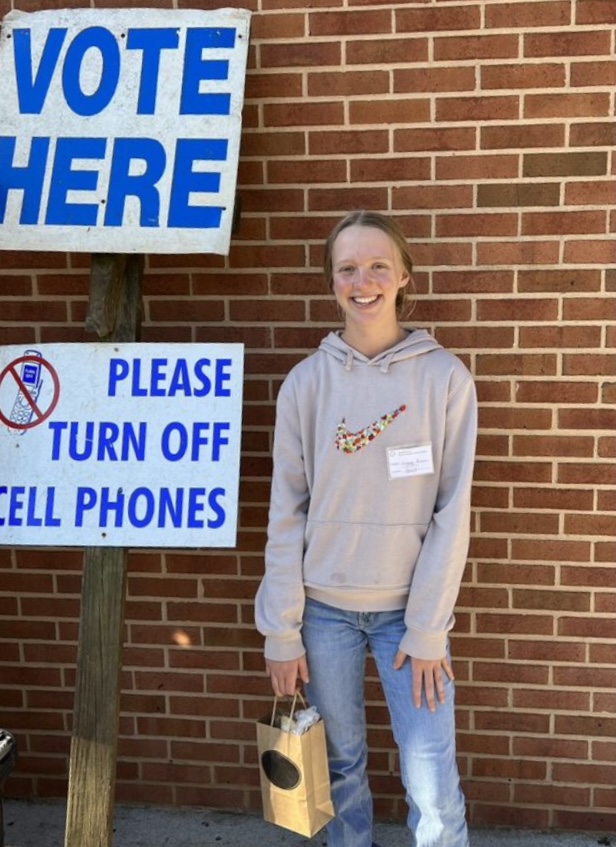
By: Kimberly Brown
Georgia State University
With political polarization levels being higher than ever seen, citizens are divided on almost every belief: except voting.
The patterns I saw among young, old, minorities, and women all connected in one way, how much they cared about their vote.
When I started the process of becoming a poll worker, I was very hesitant about working at a precinct. I’m 17 years old, and the only time I’ve been in a precinct is when I was very little, holding my dad’s hand as he cast his vote. The steps to becoming a poll worker were unclear and not set forth by the county in a straightforward manner. However, as my fellow honors students pushed through, we were all able to get hired within a few days of the deadline.
Working early voting on the last day that citizens could vote early wasn’t anything less than stressful. Voters scrambled around the precinct, as they all wanted to ensure they got a chance to vote that day. Early voting served as my training day; my first thoughts were formed from this four-hour shift. Poll working was a stressful job that had little to no impact on the people in the community. As I finished my shift, I could not bear the thought of a longer 16-hour long shift that would be more hectic than early voting. With so many new people in and out of the precinct in minutes, it was hard to tell if poll workers had any impact on the voters.
Moving into election day, I was nervous due to my experience with early voting. However, quite the opposite happened. Voters slowed down, and it was not nearly as stressful. As I talked to other poll workers, I realized that many took the day off to work at the precinct. The workers were very committed to serving the community and wanting to help democracy by ensuring there was no shortage of workers. I moved through various jobs, working the poll pads, ballot machines, watching over voting machines, and taking down the numbers every hour.
When working the poll pads, I interacted with many different people. All had taken time out of their day to get to a precinct to vote, and I rarely had an interaction with a rude voter. Many genuinely thanked the poll workers, even shaking hands and asking if we needed anything. The majority of voters told to go to a different precinct were very cooperative, and it was quite clear to the other workers and I how dedicated the citizens were to getting their vote cast.
During one of my shifts as a voting machine watcher, a fellow poll worker and I noticed that two voters had been discussing the ballot out loud. The assistant manager was informed and went over to address the situation. As the two voters walked over to the ballot casting station, one of the two voters exclaimed loudly, “I feel like I was harassed!” A poll watcher immediately jumped up and proudly stated, “That’s what I’m here for.” The two voters and the poll watcher walked outside the building to discuss the situation with the manager. As the case was resolved loudly, I noticed how the voters in the precinct at the time of the incident didn’t seem to care. They carried on voting and thanked the poll workers like usual.
I also could use the knowledge I had learned in political science class when helping voters. Many voters had no idea what a provisional ballot was and how it worked, and I also explained to two voters what the (I) on the ballot means.
As election day ended, and all the workers started packing up all the equipment, the conversation was solely about the surprise we all had by the voters. They were friendly, happy, and determined to get their vote cast. One worker said that as she was working the poll pads, the voter had been to three places, and each precinct kept sending the voter somewhere else. The worker said she looked tired, but not frustrated. The citizen cast her ballot and was incredibly happy to be able to vote.
I had such a great experience with the voters and poll workers that I decided to work the runoff election. My runoff experience was much more fun, as I knew everyone there and what to expect. We processed 25% more voters on the runoff day than on election day. I generally worked the same jobs I did on election day but took more of a manager stance at the poll pads. Being more technology-oriented, I was able to make the poll pad process as fast and more efficient by having the workers insert the cards earlier and also preparing the bar code scanners earlier. I also suggested that the greeters ask the voters to pull their cards out ahead of time to make the line go faster. The voters noticed these changes and expressed how appreciative they were about the fast line, even with an increase in voters.
Looking back on my poll working experience, I am very thankful to have had this opportunity to interact with my community and see how enthusiastic voters are about democracy.
The media is so polarizing, but this experience showed me how citizens, no matter their background, love their right to vote and will do a lot to ensure their vote counts.

Not bad